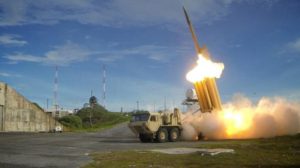
Yonhap:
The United States said Thursday any military attacks on South Korea will be defeated with an “effective and overwhelming” force amid ever-growing nuclear and missile threats from North Korea.
In the annual Security Consultative Meeting (SCM) held in Washington, Defense Secretary Ash Carter reaffirmed the extended deterrence protection by the U.S. of its key Asian ally, as the North continues to ramp up its provocative acts.
The defense chief warned any attack will be crushed and the use of nuclear weapons will meet an overwhelming response.
“Extended deterrence” refers to the commitment to use nuclear weapons, if the need arises, to deter attacks on allies. The U.S. has provided extended deterrence and the “nuclear umbrella” to South Korea after withdrawing nuclear warheads from the country in the early 1990s.
It is the first time that Washington has officially included the strongest-ever terms to highlight its commitment to respond in the case of an attack by the North in the Joint Statement adopted by Carter and his South Korean counterpart Han Min-koo.
A Seoul defense ministry official said the U.S. does not usually cite the names of its allies when it elaborates on its extended deterrence commitments, but South Korea is definitely one of them.
In the “two plus two” alliance talks that brought together South Korean Foreign Minister Yun Byung-se and Defense Minister Han with their U.S. counterparts Secretary of State John Kerry and Defense Secretary Ashton Carter a day earlier, Washington’s defense chief made similar remarks stressing that there should be no mistaking the intent to guard South Korea from its northern neighbor.
What he said was interpreted as a serious warning against Pyongyang that launched two missiles, both believed to be intermediate-range ballistic missiles (IRBMs), in the past week on the occasion of the allies’ security and military talks being held this week.
The rare use of hawkish words by the U.S. could be seen as a response to growing calls among South Koreans that Seoul should develop its own nuclear weapons or demand the return of tactical U.S. nuclear weapons, experts said.
They also said moves by the U.S. to assuage security concerns reflect the growing realization that the world can no longer ignore the North’s evolving nuclear and missile development programs. Pyongyang has conducted five nuclear tests in the past decades and launched multiple missiles to achieve its stated goal of developing a nuclear-armed, long-range missile that could reach the U.S. mainland.
Though the North has failed in seven out of its eight tests this year of its Musudan IRBMs, some experts warned these missiles could become fully operational as early as next year. A Musudan launched in June flew 400 kilometers into the East Sea, and it was hailed by the communist state as proof of its ability to hit U.S. bases across “the Pacific operation theater.”
If North Korea is equipped with nuclear-tipped intercontinental ballistic missiles, the U.S. may not provide extended deterrence to South Korea due to local opposition about huge casualties and other losses resulting from the North’s retaliatory attacks on the U.S. mainland, according to observers.
In other efforts to counter the North’s threats, Seoul and Washington at the latest SCM have agreed to increase naval cooperation to respond to the North’s maritime provocations, as the communist country claimed the successful launch of a submarine-launched ballistic missile (SLBM) in August.
